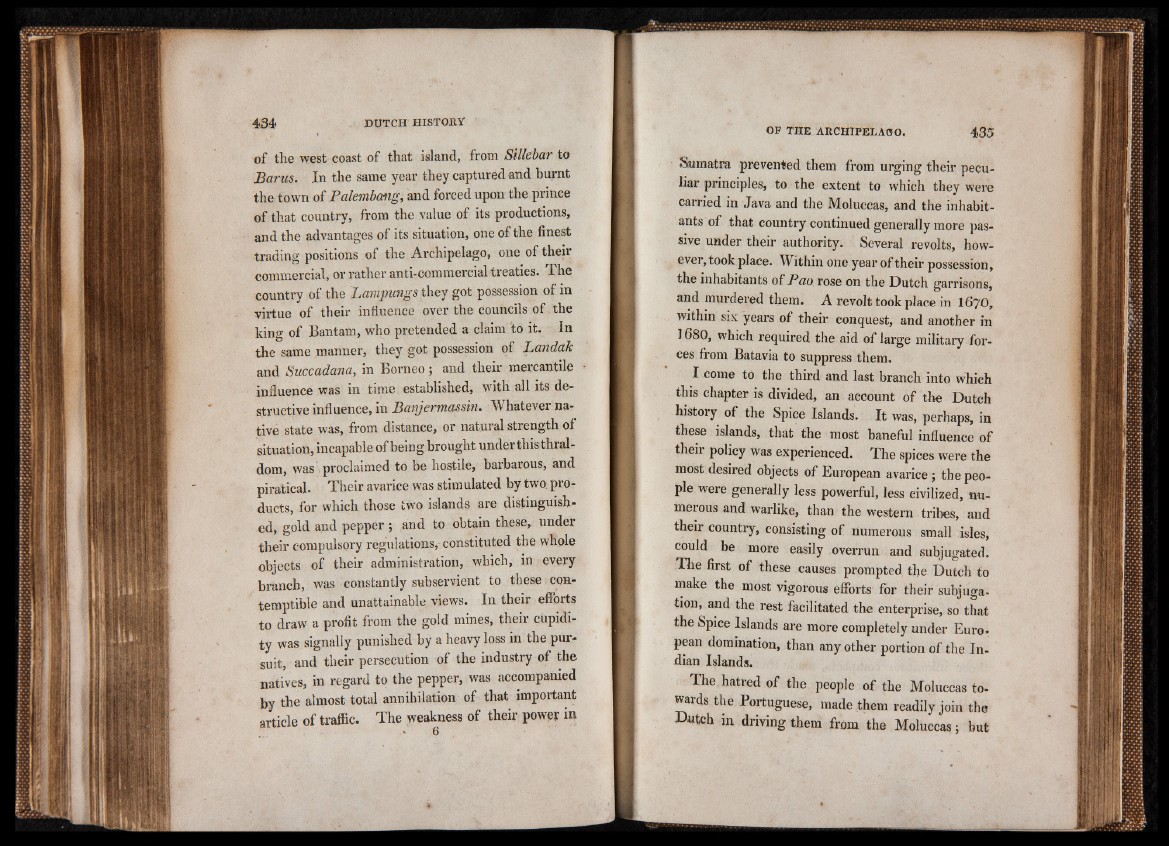
of the west coast of that island, from Sillebar to
JBarus. In the same year they captured mid burnt
the town of Palembang, and forced upon the prince
of that country, from the value of its productions,
and the advantages of its situation, one of the finest
trading positions of the Archipelago, one of their
commercial, or rather anti-commercial treaties« The
country of the Lampungs they got possession of m
virtue of their influence over the councils of the
king of Bantam, who pretended a claim to it. In
the same manner, they got possession of Landak
and ISuccadana, in Borneo; and their mercantile
influence was in time established, with all its destructive
influence, in Banjermassin. Whatever native
state was, from distance, or natural strength of
situation, incapable of being brought under this thraldom,
was 'i proclaimed to be hostile, barbarous, and
piratical. Their avarice was stimulated by two products,
for which those two islands are distinguished,
gold and pepper ; and to obtain these* under
their compulsory regulations, constituted the whole
objects of their administration, which, in every
branch, was constantly subservient to these contemptible
and unattainable views. In their efforts
to draw a profit from the gold mines, their cupidity
was signally punished by a heavy loss in the pursuit,
and their persecution of the industry of the
natives, in regard to the pepper, was accompanied
by the almost total annihilation of that important
article of traffic. The weakness of their power in
Sumatra prevented them from urging their peculiar
principles, to the extent to which they were
carried in Java and the Moluccas, and the inhabitants
of that country continued generally more passive
under their authority. Several revolts, however,
took place. Within one year of their possession,
the inhabitants of Puo rose on the Dutch garrisons,
and murdered them. A revolt took place in I67O,
within six years of their conquest, and another in
1680, which required the aid of large military forces
from Batavia to suppress them.
I come to the third and last branch into which
this chapter is divided, an account of the Dutch
history of the Spice Islands. It was, perhaps, in
these islands, that the most baneful influence of
their policy was experienced. The spices were the
most desired objects of European avarice ; the people
were generally less powerful, less civilized, numerous
and warlike, than the western tribes, and
their country, consisting of numerous small isles,
could be more easily overrun and subjugated.
The first of these causes prompted the Dutch to
make the most vigorous efforts for their subjugation,
and the rest facilitated the enterprise, so that
the Spice Islands are more completely under Euro-
pean domination, than any dian Islands. other portion of the InThe
hatred of the people of the Moluccas to*-
wards the Portuguese, made them readily join the
Dutch in driving them from the Moluccas; but